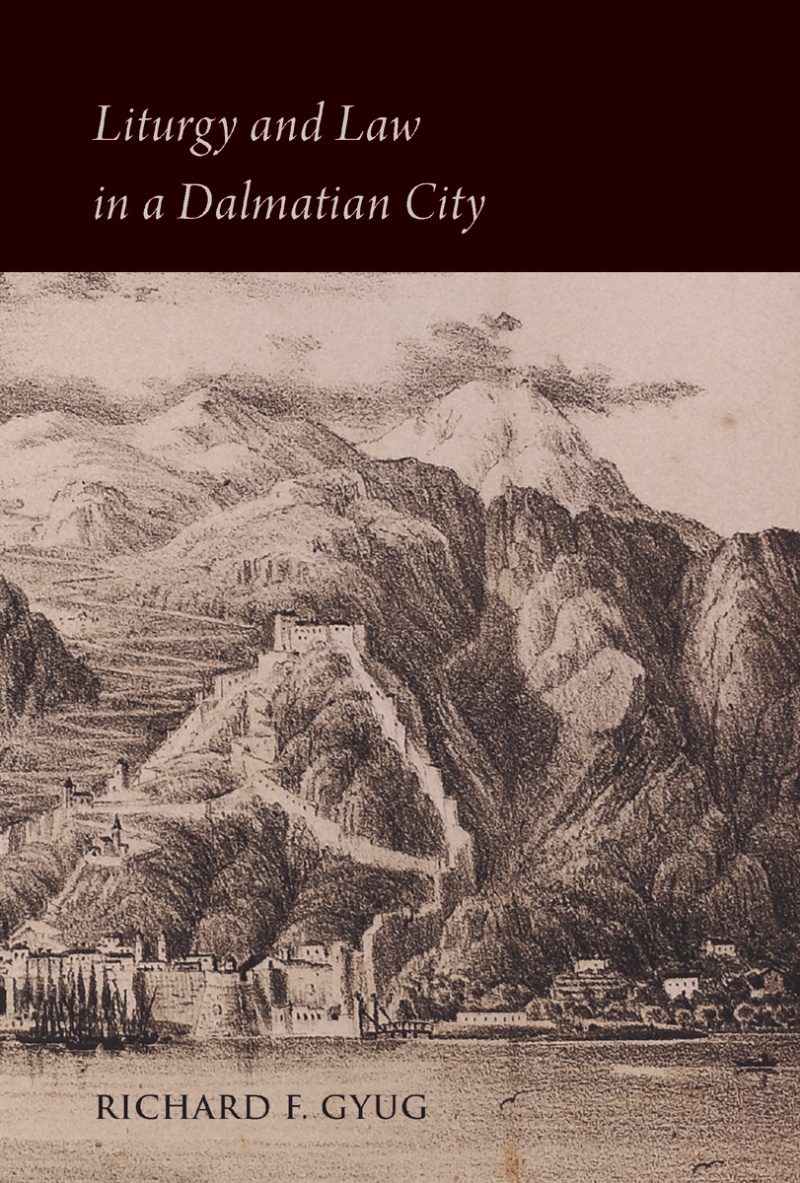
Liturgy and Law in a Dalmatian City: The Bishop's Book of Kotor (Sankt-Peterburg, BRAN, F. no. 200)
Studies and Texts 204; Monumenta Liturgica Beneventana 7. xxxii, 640 pp. plus 10 plates. ISBN 978-0-88844-204-8 • Cloth • $110
The manuscript that is the subject of this study and edition constitutes a rich source for the study of the society and culture of the southern Dalmatian coast. The major parts of the manuscript were written in Beneventan script in the mid-twelfth century, perhaps for the dedication in 1166 of the new cathedral of Kotor in southern Dalmatia, now Montenegro. The core of the manuscript, which contains a lectionary with epistles and gospels for major feasts of the liturgical year and a pontifical with ceremonies proper to a bishop, functioned as a liturgical compendium for the use of the cathedral and bishop of Kotor. Two gatherings of sermons were added to the codex, likely in the early thirteenth century, and ecclesiastical documents and communal statutes were copied in the margins and on blank pages.
The contents of the manuscript and its layers of composition reveal a complex history of civic development, cultural interactions and liturgical creativity. The Lectionary preserves conservative practices typical of the Beneventan region; the Pontifical re-works liturgical and canonical materials from Rome, southern Italy, Norman Sicily and further afield in unique ways that became a local model for copying at least one later pontifical; the sermons are unusual new texts; and the documentary additions, which are among the earliest statutes in Dalmatia, shed light on the history and legal development of the city and region.
Transcriptions of the manuscript’s lectionary, pontifical, sermons and statutes are accompanied by a critical apparatus and an apparatus of parallel citations. The volume is prefaced by a comprehensive historical introduction that provides an extensive history of Kotor and its church, as well as a codicological analysis of the manuscript and discussion of its contents, with particular attention to the sources of the liturgical and canonicoliturgical items and their arrangement.
Author
Richard F. Gyug is Professor of History, Fordham University, and Research Fellow at the Pontifical Institute of Mediaeval Studies. He is the author of numerous publications on liturgical books in southern Italy and Dalmatia, and on social history in medieval Catalunya, including Missale Ragusinum: The Missal of Dubrovnik (1990) and The Diocese of Barcelona during the Black Death: The Register “Notule communium” 15 (1348–1349) (1994). He is also editor of Medieval Cultures in Contact (2003) and coeditor, with Kathleen G. Cushing, of Ritual, Text and Law: Studies in Medieval Canon Law and Liturgy presented to Roger E. Reynolds (2004). In addition to on-going work on Beneventan manuscripts, he has presented numerous public lectures on a wide range of medieval topics, including lectures on “Past and Present on the Camino de Santiago,” in which he explores how the medieval context of the famous pilgrimage route shapes the experiences of walkers and pilgrims on the modern Camino de Santiago. Since 2007, he has walked several times with classes along the last 300 kilometres of the route.
Endorsements
“‘The Bishop’s Book of Kotor,’ a liturgical collection from the mid-twelfth century written in Beneventan script and for use in southern Dalmatia, might seem unprepossessing to casual readers. But in allowing this manuscript to speak with something akin to its own voice, Richard Gyug uncovers in its varied and complex layers a work rich in influence and creativity. Following its fortunes through Kotor’s early Apulian‐Beneventan church, through the Norman invasions of the late eleventh century and the Serbian period of 1189–1420, and finally into the Venetian colonial regime, the author illuminates the remarkable political, liturgical, and cultural strands that have shaped the work and the region in the middle ages. The edition of the manuscript, itself exemplary, is supported by a detailed historical introduction which together should spur further research into a fascinating, if still somewhat understudied field.”
Katarina Livljanić, Université Paris-Sorbonne (Paris IV); Ensemble Dialogos“This edition and study of the liturgical compendium found in Sankt-Peterburg, BRAN, F. no. 200 is a valuable contribution to Beneventan studies and to the history of medieval Dalmatia, as well as to manuscript studies more widely. Working with a rare combination of interdisciplinary reach and historical rigour, Richard Gyug meticulously analyses the manuscript’s contents and layers of composition, using them as new sources in the study of the liturgy, law, and culture of southern Dalmatia in the middle ages. The author successfully shows that the liturgists of Kotor saw in contemporary and earlier liturgical practices a possible range of options, not a single inflexible model, and his argument that the manuscript may have been composed for the dedication of the new cathedral of Kotor in 1166 is persuasive. The editions of the ecclesiastical donations, testaments, and episcopal acts between ca. 1090 and 1220, and of statutes and acts of the commune of Kotor dating from 1186 to 1255 added in the margins of the manuscript in several hands, are models of their kind and will prove fundamental to future research in the history of medieval Kotor.”
Rozana Vojvoda, Museum of Modern and Contemporary Art Dubrovnik
Ordering
Customers in North America please order through University of Toronto Press Distribution by phone (1-800-565-9523) or by email (utpbooks@utpress.utoronto.ca). If you would like to order through UTP Distribution using another method such as mail or fax, please click here for a full list of contact and ordering methods. PIMS books are also available on Amazon.ca (for Canadian customers) and Amazon.com (for customers in the U.S.).
Customers outside North America please order through Brepols Publishers. PIMS books are available through the Brepols online catalogue.


